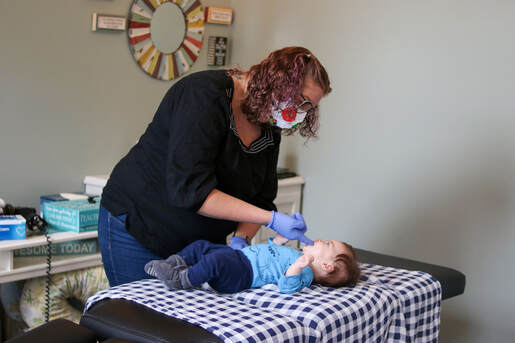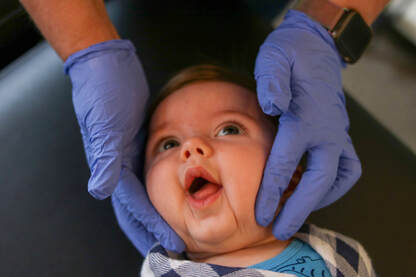Treatment Philosophies
Often, concerned parents have done a fair bit of research online about their child's struggles before coming into the office for their first appointment, so they've got some background on the struggles facing their children. They may discover along the way that there is a lot of conflicting information between various internet resources, and even from provider to provider. By the time families make it to our office, they’ve frequently already had discussions with their pediatrician, lactation consultants or other feeding therapists, and possibly pediatric dentists, chiropractors, speech-language pathologists (SLPs), or ear, nose and throat (ENT) doctors. It is with this in mind that the following has been written, to help make sense of the confusing and conflicting information out there.
What are the signs and symptoms of TOTs? The answer to this question is complex, and for this reason it's easily and frequently misunderstood by parents and providers alike. Sometimes the symptoms can seem to run opposite to one another (i.e. either extreme weight gain or extremely slow gain, choking and sputtering while nursing or prolonged nursing sessions, your baby may nurse every hour through the night or may sleep through the night much earlier and nurse less frequently than expected). This is because there's more to infant feeding than the baby's ability to suck and swallow- the volume of milk the breast or chest-feeding parent makes and the force with which their letdowns occur greatly influence the trajectory of the nursing relationship. Babies who can not effectively transfer milk from a breast or bottle but who receive milk at a rapid flow, through an overactive milk ejection reflex (also called "letdown") or bottle feedings that are not paced may gain weight at a rapid rate, as they are unable to manage the flow of milk by themselves and they typically end up overeating. On the other hand, this same baby, if the family is feeding them via paced feeds or at a breast/chest that is more typically producing and behaving, might have a great deal of trouble gaining weight. In both of these situations, the baby may or may not be extremely gassy and/or spit up at such a rate that they are diagnosed with acid reflux and possibly even put on medication . This is dependent on the way in which their TOTs impact their ability to swallow.
Is my baby tongue, lip, or cheek tied? The answer is that it depends entirely on the nature of your baby's muscular state in combination with the length of the frena that connect these body parts to the gums. Frena are small bands of connective tissue that can sometimes limit mobility of the tissues they're connecting, in which case they're considered "tied." Sometimes folks believe they have ties in their babies but the frena themselves are actually in good working order, and tethered tissues can be the result of muscular tension caused by fetal or birth trauma. This is why it is so important to ensure your baby is assessed head to toe by a qualified IBCLC to ensure that you don't end up subjecting your baby to unnecessary procedures! Many babies arrive at our office having been diagnosed with ties by their pediatrician or IBCLC when there are not actually any ties present, because most providers haven't had sufficient training and experience to be able to tell the difference between ties and muscular tension that inhibits your child's range of motion in their lips, cheeks, or tongue.
What are the signs and symptoms of TOTs? The answer to this question is complex, and for this reason it's easily and frequently misunderstood by parents and providers alike. Sometimes the symptoms can seem to run opposite to one another (i.e. either extreme weight gain or extremely slow gain, choking and sputtering while nursing or prolonged nursing sessions, your baby may nurse every hour through the night or may sleep through the night much earlier and nurse less frequently than expected). This is because there's more to infant feeding than the baby's ability to suck and swallow- the volume of milk the breast or chest-feeding parent makes and the force with which their letdowns occur greatly influence the trajectory of the nursing relationship. Babies who can not effectively transfer milk from a breast or bottle but who receive milk at a rapid flow, through an overactive milk ejection reflex (also called "letdown") or bottle feedings that are not paced may gain weight at a rapid rate, as they are unable to manage the flow of milk by themselves and they typically end up overeating. On the other hand, this same baby, if the family is feeding them via paced feeds or at a breast/chest that is more typically producing and behaving, might have a great deal of trouble gaining weight. In both of these situations, the baby may or may not be extremely gassy and/or spit up at such a rate that they are diagnosed with acid reflux and possibly even put on medication . This is dependent on the way in which their TOTs impact their ability to swallow.
Is my baby tongue, lip, or cheek tied? The answer is that it depends entirely on the nature of your baby's muscular state in combination with the length of the frena that connect these body parts to the gums. Frena are small bands of connective tissue that can sometimes limit mobility of the tissues they're connecting, in which case they're considered "tied." Sometimes folks believe they have ties in their babies but the frena themselves are actually in good working order, and tethered tissues can be the result of muscular tension caused by fetal or birth trauma. This is why it is so important to ensure your baby is assessed head to toe by a qualified IBCLC to ensure that you don't end up subjecting your baby to unnecessary procedures! Many babies arrive at our office having been diagnosed with ties by their pediatrician or IBCLC when there are not actually any ties present, because most providers haven't had sufficient training and experience to be able to tell the difference between ties and muscular tension that inhibits your child's range of motion in their lips, cheeks, or tongue.



